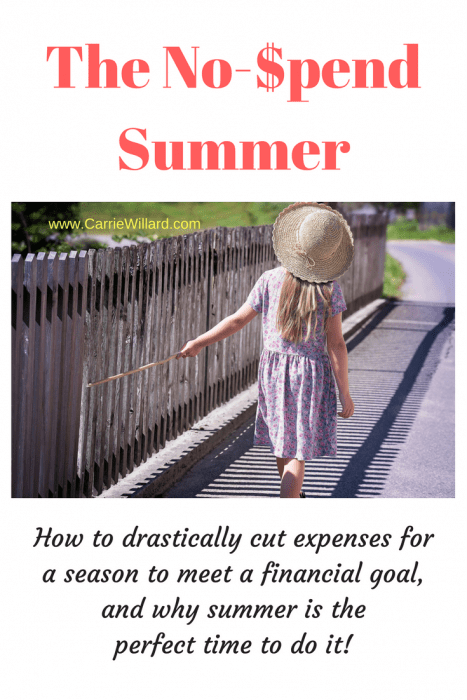A No Spend Challenge update; my family is saving for a down payment on a home (closing in February!).
Hubby and I had our budget meeting yesterday, as we always do at the end of each month. A couple of things I’ve learned about budgets along the way:

A budget is a living, breathing thing. It’s not a “one and done”.
[Tweet “A budget is a living, breathing thing. It’s not a “one and done”.”]
Every month we review last month’s spending. We talk about ways to reduce in every area. I see people criticizing the idea of budgets because they say budgets give you “permission to spend”.
Au contraire, mon ami. Pas de tout!
Well, maybe budgets give some people permission to spend, but they only give me impetus to save.
Knowing what our monthly bills typically are (utilities, housing, petroleum, etc – things that aren’t discretionary) means we know how much we can safely put into savings without endangering our “four walls” (housing, utilities, food). This was a lifesaver when we were getting out of debt, because we knew we could send very large payments to creditors without running out of money.
Every month I look for new ways to lower our recurring expenses.
Examples: in the last two months I’ve lowered our internet service costs and shaved nearly $200/month off our electrical bill.
This month I’m on the warpath about our car insurance. I’m investigating and checking prices from other companies online and looking into ways to lower our premiums (reminder to self: I need to sign up our newest driver for defensive driving).
Hubby’s homework is to call our cell phone provider and negotiate a lower bill. (If it doesn’t work, I’m cancelling my service and going with a low-cost provider like Republic Wireless or Ting.)
We discuss expenses unique to that month and add them to the budget.
For instance, new clothing for the kids as the weather changes, or needed household items, or car repairs. I used to be confused about how to handle irregular expenses. We tried having envelopes for sinking funds that we put cash into, but hubby found making frequent cash withdrawals a hassle. So instead, we simply put that item in the budget. It works fine.
My tactics for lowering the grocery budget tactics are working.
Groceries were under budget by $300 for the month, even though I wasted much more food than I’m comfy with last week (ugh – a constant battle for me).
Our house down payment total is now $12,274, meaning we’re halfway to our goal, so we’re on track to start house hunting at the end of the year.
Hubby had a great month and I did too in terms of income. We’re now working on getting our paperwork together to give to our banks so we can shop around for a mortgage. We’re making plans to meet with a realtor friend to discuss what we want. Things are getting real, real fast.
Any advice for a first time home buyer?
A few things I already know:
- Don’t get emotionally attached until after you move in, stuff happens
- Look up the crime stats and check the sex offender registry – if a “should’ve been hanged by the balls” pedophile lives next door, look elsewhere
- Have extra cash on hand for repairs
- Follow the inspector, ask questions, take notes, test windows, test taps, turn lights and ceiling fans on and off, look under furniture for clues as to the house’s condition
- Visit all times of day, talk to the neighbors, look at Google Maps and Street View
- Don’t overbuy. Our mortgage will be less than 25% of our monthly after-tax income. I have no interest in being house poor.
- Ask about utility costs – don’t want a leaky, inefficient house
- Check for dead trees on the property, look for wet areas in the yard, flooding potential, signs of termites and other vermin
- Don’t pay for features that will rarely be used. I’m interested in a house in which every square foot is used. I don’t want a fireplace, deck, formal dining room, or too much storage (minimalist here – my storage closets are half empty).
- Check appliances (if they’ll be left behind), look for leaks, make sure they work
Anything else? Thanks in advance!

Great checklist, almost spit out my coffee at #2, wasn’t expecting that! LOL! But oh so true!! We have hit our down payment fund, but now I’m saving moving/furniture expenses and doubling up our EF. I’m with you, I don’t want to be house poor either. No tips for you as I’m in the same boat… Good luck with your savings, you’re doing awesome!!!
Dave Ramsey recommends not purchasing a home unless you do a 15-yr mortgage, and the monthly payment is not more than 1/4 of your monthly take-home. You pay a lot less in interest, and pay off the mortgage much more quickly than with a 30-yr. mortgage.
It looks like you already have the “smaller is better” mindset (we share this!). This may run counter to my next piece of advice: buy as new a home as possible, b/c homes being built today are much more energy efficient than home that were built back in the 90’s and prior. On the other hand, your family is big enough that a “small” new home would not be too big for you.
Hi Carrie 🙂 I’ve long followed your blog and admire your tenacity to save aggressively for a down payment on your first home. As a licensed real estate broker for 15 years, I have loads of experience in this arena and have written a blog post with helpful tips that I’d love to pass long. 🙂 Looks like security won’t permit me to link it here, but my blog is Unto Adoption dot org, search “buy house” and you’ll find it. Best of luck in the hunt– that’s the fun part!
Hi Carrie,
First time reader here. I followed TFG’s link today and found this post. I’m a long time Kristen fan, and also follow Katy at NCA and Pete over at MMM, particularly the MMM Forum. FWIW, I am FIRE. DH and I have purchased nine homes so far, four of which we still own.
Since mortgage rates are at historically low levels, here’s a wiser approach. Get a 30-year, low-cost, fixed-rate mortgage with no pre-payment penalty. Shop hard to find rock bottom rates. Once you move into your new home, you may accelerate your payment schedule to any level that is comfortable by prepaying your mortgage. Should you face unexpectedly high expenses for any reason, you can dial back to the regular payment temporarily without stress or penalty. The advantage of this approach is complete flexibility. Unexpected expenses are legion when buying and outfitting a new house. The peace of mind this method provides is priceless. Should you ever wish to keep your first home as a rental property, it will be easier to have positive cash flow with a 30-year, owner-occupied mortgage rate locked in place.
Pro Tip: Using a lender who will not resell your loan on the secondary market means your loan is far less likely to be churned through multiple servicers, which can easily result in payment snafus. Look for local banks or credit unions and ask if they intend to hold or resell your mortgage.
Filed under: Things I Wish I’d Known Sooner.
Best of luck to you!
HI Diane!
I am also a MMM fan and have just begun posting in the forums there. The 30-year mortgage scares me because I’m afraid of being all too human. Being able to pay less might mean we do just that – like keeping cookies in the pantry instead of not having them available at all!
I need to do more research, but as I understood it, you’ll end up paying much more for your house if you do a 30, even if you pre-pay it. Is that incorrect?
Thanks so much for your comment! We are going to get our mortgage loan from a credit union but I will ask that question.